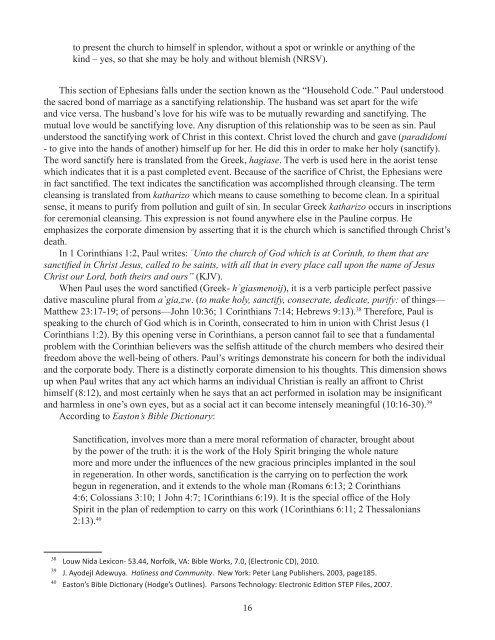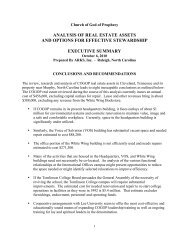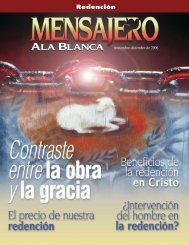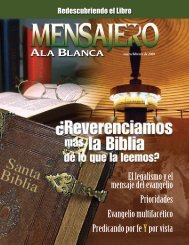The Pursuit of the Holy God - Church of God of Prophecy
The Pursuit of the Holy God - Church of God of Prophecy
The Pursuit of the Holy God - Church of God of Prophecy
You also want an ePaper? Increase the reach of your titles
YUMPU automatically turns print PDFs into web optimized ePapers that Google loves.
to present <strong>the</strong> church to himself in splendor, without a spot or wrinkle or anything <strong>of</strong> <strong>the</strong><br />
kind – yes, so that she may be holy and without blemish (NRSV).<br />
This section <strong>of</strong> Ephesians falls under <strong>the</strong> section known as <strong>the</strong> “Household Code.” Paul understood<br />
<strong>the</strong> sacred bond <strong>of</strong> marriage as a sanctifying relationship. <strong>The</strong> husband was set apart for <strong>the</strong> wife<br />
and vice versa. <strong>The</strong> husband’s love for his wife was to be mutually rewarding and sanctifying. <strong>The</strong><br />
mutual love would be sanctifying love. Any disruption <strong>of</strong> this relationship was to be seen as sin. Paul<br />
understood <strong>the</strong> sanctifying work <strong>of</strong> Christ in this context. Christ loved <strong>the</strong> church and gave (paradidomi<br />
- to give into <strong>the</strong> hands <strong>of</strong> ano<strong>the</strong>r) himself up for her. He did this in order to make her holy (sanctify).<br />
<strong>The</strong> word sanctify here is translated from <strong>the</strong> Greek, hagiase. <strong>The</strong> verb is used here in <strong>the</strong> aorist tense<br />
which indicates that it is a past completed event. Because <strong>of</strong> <strong>the</strong> sacrifice <strong>of</strong> Christ, <strong>the</strong> Ephesians were<br />
in fact sanctified. <strong>The</strong> text indicates <strong>the</strong> sanctification was accomplished through cleansing. <strong>The</strong> term<br />
cleansing is translated from katharizo which means to cause something to become clean. In a spiritual<br />
sense, it means to purify from pollution and guilt <strong>of</strong> sin. In secular Greek katharizo occurs in inscriptions<br />
for ceremonial cleansing. This expression is not found anywhere else in <strong>the</strong> Pauline corpus. He<br />
emphasizes <strong>the</strong> corporate dimension by asserting that it is <strong>the</strong> church which is sanctified through Christ’s<br />
death.<br />
In 1 Corinthians 1:2, Paul writes: “ Unto <strong>the</strong> church <strong>of</strong> <strong>God</strong> which is at Corinth, to <strong>the</strong>m that are<br />
sanctified in Christ Jesus, called to be saints, with all that in every place call upon <strong>the</strong> name <strong>of</strong> Jesus<br />
Christ our Lord, both <strong>the</strong>irs and ours” (KJV).<br />
When Paul uses <strong>the</strong> word sanctified (Greek- h`giasmenoij), it is a verb participle perfect passive<br />
dative masculine plural from a`gia,zw. (to make holy, sanctify, consecrate, dedicate, purify: <strong>of</strong> things—<br />
Mat<strong>the</strong>w 23:17-19; <strong>of</strong> persons—John 10:36; 1 Corinthians 7:14; Hebrews 9:13). 38 <strong>The</strong>refore, Paul is<br />
speaking to <strong>the</strong> church <strong>of</strong> <strong>God</strong> which is in Corinth, consecrated to him in union with Christ Jesus (1<br />
Corinthians 1:2). By this opening verse in Corinthians, a person cannot fail to see that a fundamental<br />
problem with <strong>the</strong> Corinthian believers was <strong>the</strong> selfish attitude <strong>of</strong> <strong>the</strong> church members who desired <strong>the</strong>ir<br />
freedom above <strong>the</strong> well-being <strong>of</strong> o<strong>the</strong>rs. Paul’s writings demonstrate his concern for both <strong>the</strong> individual<br />
and <strong>the</strong> corporate body. <strong>The</strong>re is a distinctly corporate dimension to his thoughts. This dimension shows<br />
up when Paul writes that any act which harms an individual Christian is really an affront to Christ<br />
himself (8:12), and most certainly when he says that an act performed in isolation may be insignificant<br />
and harmless in one’s own eyes, but as a social act it can become intensely meaningful (10:16-30). 39<br />
According to Easton’s Bible Dictionary:<br />
Sanctification, involves more than a mere moral reformation <strong>of</strong> character, brought about<br />
by <strong>the</strong> power <strong>of</strong> <strong>the</strong> truth: it is <strong>the</strong> work <strong>of</strong> <strong>the</strong> <strong>Holy</strong> Spirit bringing <strong>the</strong> whole nature<br />
more and more under <strong>the</strong> influences <strong>of</strong> <strong>the</strong> new gracious principles implanted in <strong>the</strong> soul<br />
in regeneration. In o<strong>the</strong>r words, sanctification is <strong>the</strong> carrying on to perfection <strong>the</strong> work<br />
begun in regeneration, and it extends to <strong>the</strong> whole man (Romans 6:13; 2 Corinthians<br />
4:6; Colossians 3:10; 1 John 4:7; 1Corinthians 6:19). It is <strong>the</strong> special <strong>of</strong>fice <strong>of</strong> <strong>the</strong> <strong>Holy</strong><br />
Spirit in <strong>the</strong> plan <strong>of</strong> redemption to carry on this work (1Corinthians 6:11; 2 <strong>The</strong>ssalonians<br />
2:13). 40<br />
38 Louw Nida Lexicon- 53.44, Norfolk, VA: Bible Works, 7.0, (Electronic CD), 2010.<br />
39 J. AyodejI Adewuya. Holiness and Community. New York: Peter Lang Publishers, 2003, page185.<br />
40 Easton’s Bible Dictionary (Hodge’s Outlines). Parsons Technology: Electronic Edition STEP Files, 2007.<br />
16

















